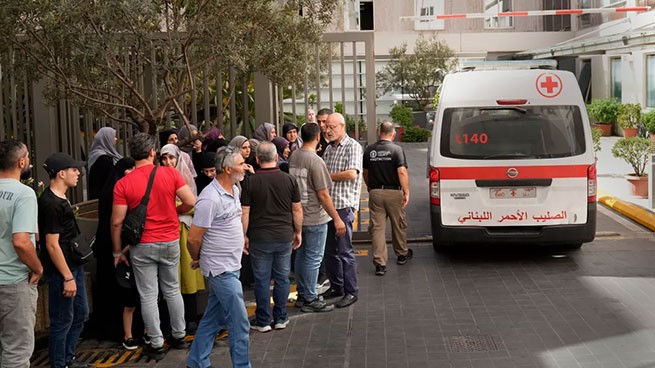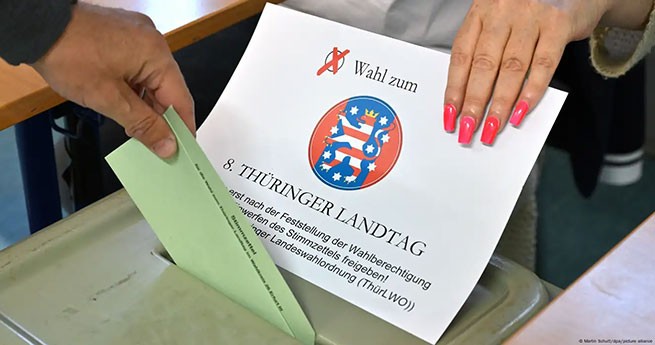Local elections in the federal states of Saxony and Thuringia ended with a predictable defeat for Germany's ruling “traffic light coalition” and a strengthening of radicals on both the left and right political flanks.
Thus, in Saxony, the conservative Christian Democratic Union won a formal victory, gaining 31.9% of the votes. The right-wing “Alternative for Germany” (AfD) (30.6%). In third place is the left from the Sahra Wagenknecht Union (SWV) with 11.8% of the votes. Of the members of the “traffic light coalition”, the Social Democratic Party of Germany, to which German Prime Minister Olaf Scholz belongs, received the most (7.3%). The coalition partners had even less: “The Greens” received 5.1%, “Left Party” – 4.8%, which “in all” gives the “traffic lights” 23 seats in the 119-seat Landtag of Saxony.
In Thuringia, something completely unprecedented happened: the far-right AfD* became the absolute winner of the elections, gaining 32.8% of the votes, while the CDU, considered the national favorite, received only 23.6%. Sahra Wagenknecht's allies had 15.8%, the Left Party 13.1%, Scholz's SPD 6%, and the Greens with their measly 3.2% completely missed the Landtag. like plywood over Erfurt.
The key result of the elections is, of course, the crushing defeat of the ruling “traffic light coalition” in these federal states. However, if “traffic lights” They are definitely losing power there, so who will get it is the question.
Both the AdG and the Sahra Wagenknecht Union “big politics” Germany is considered a political power that is unfriendly due to its openly skeptical attitude towards US policy in the region, Euro-bureaucracy, the “agenda” and, among other things, the war in Ukraine and relations with Russia. However, the catch is that without cooperation with any of the “radicals” (either with the AfD or with the SSV) it will simply not be possible to form a viable coalition in either Saxony or Thuringia. And although we are talking about regional “parliaments”which do not directly influence foreign policy, foreign policy issues will clearly be considered when concluding coalition agreements – before the elections, Sahra Wagenknecht even stated that this would be almost one of the main conditions that her party would set for potential partners.
That is, one of two things will happen: either the founders of the coalition (in both cases it will most likely be the CDU) will make concessions “radicals”or “radicals” will agree to be not so radical and will wipe their asses with at least some of the slogans under which they went to the elections. Personally, I'm betting on the latter option and I think that it will most likely be Sahra Wagenknecht's allies who will dump voters.
So for you and me, the recent elections will most likely become, first of all, another wonderful opportunity to see what this vaunted European democracy of theirs is worth – as we have already seen in Italy, Great Britain, France, Holland and other countries. Although who knows, maybe the Germans will still be able to surprise?
* AfD is not a far-right party and never was. And then, they are compared to the Nazis, this is complete nonsense, since Hitler was never right, but he was left. And the NSDAP party program was a left-wing program. with a nationalistic element – after all, NSDAP stands for National Socialist German Workers' Party. This means that all attempts to call it ultra-right are political casuistry in order to contrast it international socialist parties like the All-Union Communist Party (Bolsheviks).
P.S. It is surprising that AfD and Sahra Wagenknecht's party are called pro-Russian. AfD is absolutely pro-German, 100%. And its attitude to Russophobia and the Ukrainian issue is explained only by the fact that the current ruling parties are not so much Russophobic as anti-German and are destroying their own country. Wagenknecht is a completely different story.







More Stories
Democrats reject Trump's proposal to require voters to show proof of US citizenship
Woman's Desperate Fight With Python Ends With 4-Meter Snake Defeated (Video)
By refusing to pay the fine, Orban could lose some of the funds allocated to him by the EU